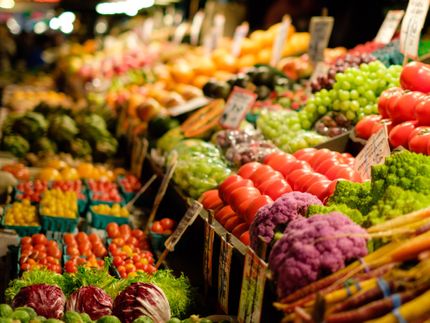Gen Z demand radical change from the food sector to tackle access to healthy and affordable food
New research reveals young people across Europe want an overhaul of how they access, discuss and learn about healthy food
Advertisement
The research commissioned by EIT food, the world's largest food innovation ecosystem, supported by the European Institute of Innovation and Technology (EIT), surveyed over 2,000 18-24 year olds from across the UK, France, Germany, Poland and Spain. The findings point to a generation that is very interested, knowledgeable and entrepreneurial when it comes to their eating habits, and especially how they link to their wellbeing and mental health.

Gen Z demand radical change from the food sector to tackle access to healthy and affordable food
EIT Food
Over half of 18-24 year olds (52%) track their food in some way, though this figure differentiates starkly across countries, rising to 65% of young people in Germany compared to just 38% in France. This suggests that Gen Z are very interested and engaged with their eating habits. The majority of this tracking (36% of young people) is focused on counting calories, however a quarter of all young people (24%) also track the macronutrients (or “macros”) of the food they eat.
These savvy Gen-Zers prefer whole, organic and plant-based foods as some of their healthiest options, and 79% consider processed foods unhealthy.
Ongoing attention to health amidst the Covid-19 pandemic has heightened awareness of the importance of this to young people, with over half (58%) saying the pandemic has made them more aware of eating healthily. Meanwhile, two-thirds (67%) say that healthy food is simply fashionable at the moment.
Advice gap leads young people to rely on social media platforms such as TikTok and Instagram for healthy eating tips
Despite this keen interest and engagement with healthy eating, young people feel they aren’t getting the support they need from educators, industry and policy makers to do so. Three-quarters (75%) say they need clearer advice on how to eat a healthy, balanced diet, with two-thirds (65%) reporting they didn’t get enough education on how to eat healthily while at school.
Having a trusted, reliable source of information was identified as being vital by many respondents, with just under two thirds (61%) reporting they feel it can be hard to know how to eat healthily as there is so much conflicting advice.
Young people are looking for more detailed information from brands, especially when it comes to how food is made. Nearly eight in 10 young people (78%) would like food labels to have clearer information on the way food is processed, not just the ingredients, while three-quarters (75%) think food brands need to be more transparent with consumers about their ingredients and processes.
Young people are taking things into their own hands and attempting to fill this advice gap themselves, with two-thirds (67%) reporting they regularly look at social media content (such as TikTok or Instagram) about healthy food and healthy recipe ideas. Over half (52%), meanwhile, say they rely on social media or their friends for advice on eating healthily.
Gen Z want advice that doesn’t harm their mental health
As part of this advice, young people want a narrative around healthy eating that doesn’t risk being harmful to their mental health – such as by focusing too much on calories alone.
In fact, just over half of young people surveyed (55%) think that including calorie counts on food labels and menus can be detrimental to people’s mental health – a figure that rises to six in 10 in the UK (62%), France (60%) and Germany (61%).
What’s more, young people don’t necessarily see low calorie foods as automatically healthy: just 54% do, while a third (34%) consider them to be unhealthy.
Instead, nearly eight in 10 (77%) say young people need better advice on the link between what they eat and their mental health, a figure that rises to 82% of young women.
Access and affordability key to promoting healthy eating
When it comes to how to encourage young people to eat healthily, discounted or subsidised healthy food ranked highest amongst respondents (43%) – which is little surprise given that two-thirds (67%) think that healthy food is more expensive than unhealthy food.
Having access to healthier options was also key for a third of respondents (37%), whether for home delivered food (such as through Uber Eats or Deliveroo) or at school, college and university. This is being driven by a lack of existing options in food environments, with seven in 10 young people (73%) finding it difficult to eat healthily while on the go, or at their place of education or work.
Self-starting Gen Z look to careers in food innovation
When considering careers in the food sector, their interest in healthy eating is leading many young people to pursue jobs in food education, innovation, and equality over more traditional routes such as hospitality or farming. Two-thirds of young people would consider taking a job in food education (66%) or food innovation (64%), the highest ranking of all roles across the food sector.
Just under two thirds (61%), meanwhile, would be interested in taking a role that improved equality of food access.
EIT Food launches campaign championing the voices of young people
EIT Food is launching a new campaign, ‘Our Food, Our Food System’ to help young people have their say on the future of food. The campaign will recruit 10 young ‘FutureFoodMakers’ to spearhead a call for radical change in the food sector, tackling access to healthy, sustainable and affordable food. It is being launched during a landmark year, which will see the first ever United Nations Summit dedicated to food systems.
Dr. Andy Zynga, CEO of EIT Food, said:
“Young people are fundamental for the transformation towards healthy and sustainable food systems. Yet our research clearly shows that they are being let down. Across Europe, 18-24 year olds find healthy food more expensive, harder to find on the go, and lacking the information and advice they need to make informed nutritional decisions.
The voice and asks of this young and dynamic food generation need to be heard by everyone across the food sector, and they need to be involved and empowered in shaping what comes next. That’s why we are launching our campaign ‘Our Food, Our Food System’, to give our young people the voice they deserve and help everyone in the food systems to understand their needs.”

































































